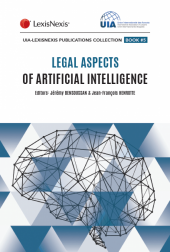Legal Aspects of Artificial Intelligence
One Year Subscription Only Terms
Subscribers receive the product(s) listed on the Order Form and any Updates made available during the annual subscription period. Shipping and handling fees are not included in the annual price.
Subscribers are advised of the number of Updates that were made to the particular publication the prior year. The number of Updates may vary due to developments in the law and other publishing issues, but subscribers may use this as a rough estimate of future shipments. Subscribers may call Customer Support at 800-833-9844 for additional information.
Subscribers may cancel this subscription by: calling Customer Support at 800-833-9844; emailing customer.support@lexisnexis.com; or returning the invoice marked 'CANCEL'.
If subscribers cancel within 30 days after the product is ordered or received and return the product at their expense, then they will receive a full credit of the price for the annual subscription.
If subscribers cancel between 31 and 60 days after the invoice date and return the product at their expense, then they will receive a 5/6th credit of the price for the annual subscription. No credit will be given for cancellations more than 60 days after the invoice date. To receive any credit, subscriber must return all product(s) shipped during the year at their expense within the applicable cancellation period listed above.
Détails des produits
Get an insider's viewpoint on the hottest legal trends with the UIA-LexisNexis Publications Collection. Legal Aspects of Artificial Intelligence is Book #5 in the 10-volume collection.
The Union Internationale des Avocats / International Association of Lawyers (UIA) is a global and multi-cultural organization for the legal profession that facilitates professional development, stimulates learning and networking, and promotes the Rule of Law.
Legal Aspects of Artificial Intelligence is for all legal practitioners and academics interested in learning about the future of the practice of law and legal decision-making. AI is everywhere, and the legal sector is no exception. In a world driven by algorithms, what should (or can) the law do and how?
In this volume, Tech Law practitioners with first-hand experience in the upheavals provoked by AI address these key questions. In addition to new forms of regulation that emerging technologies are bringing about, this book deals with the legal schemes that are today regulating the use of AI techniques, including the new European regulation on the protection of personal data.
 Lexis Nexis
Lexis Nexis 


